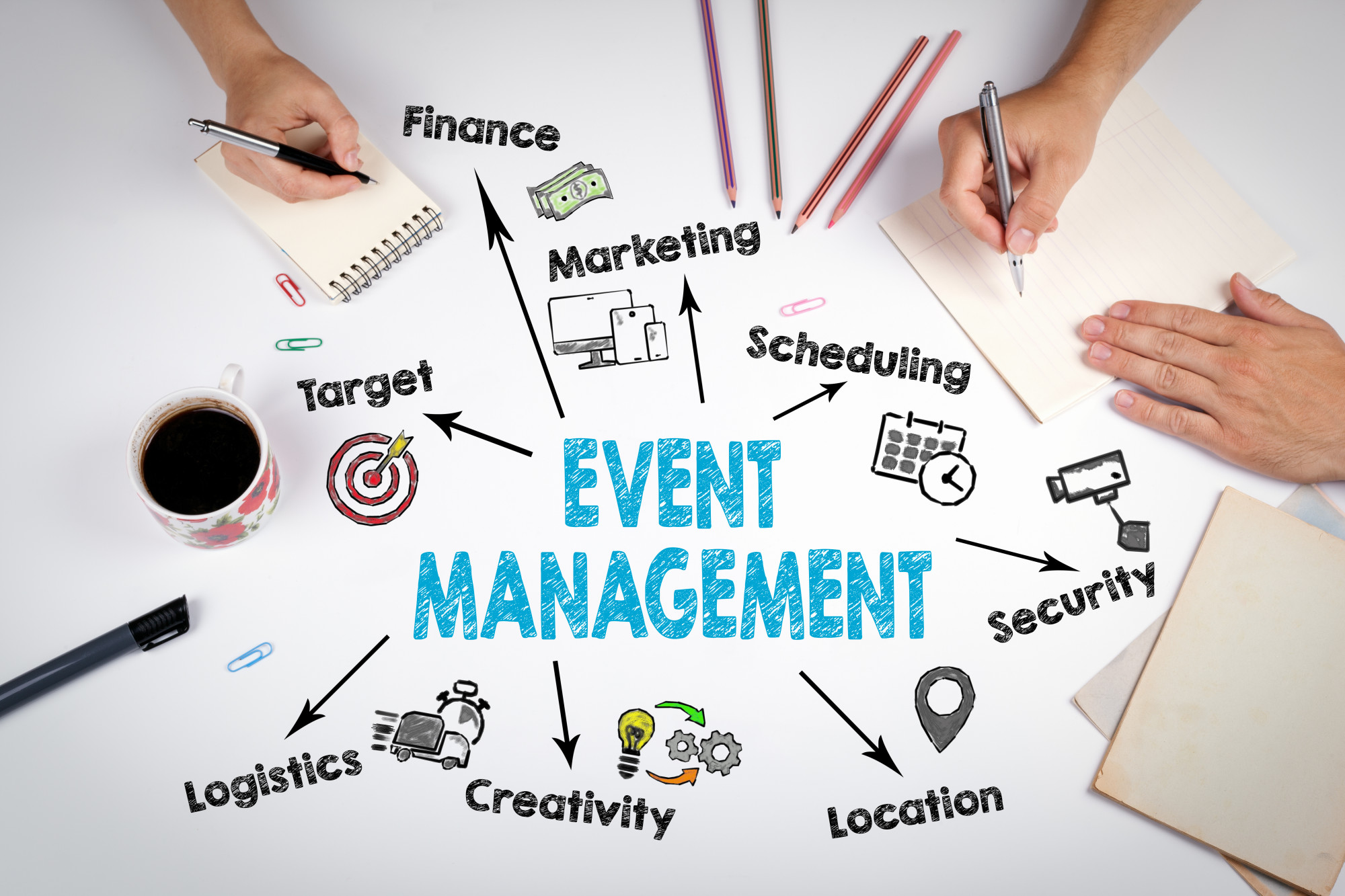Understanding All Regarding Event Management and Its Role in Effective Events
Event management is an essential consider the execution of successful gatherings. It includes careful preparation and control to ensure that every element aligns with the intended vision. From company events to social celebrations, the effectiveness of occasion management can significantly affect participant experience. Nonetheless, understanding the subtleties of this area exposes greater than just logistics. The ins and outs of communication, budgeting, and evaluation play crucial duties in shaping outcomes. What are the crucial elements that really drive success?
The Significance of Event Management
Event management plays an important duty in ensuring the success of any kind of event, whether it be a corporate meeting, wedding celebration, or celebration. It incorporates the planning, organization, and implementation of events, which needs precise focus to information and an organized approach. Successful event management assists create unforgettable experiences for attendees, promoting involvement and contentment.
Reliable event management can enhance source allocation, guaranteeing that budget plans are stuck to while making the most of the influence of the occasion. It involves coordinating different aspects such as venue choice, vendor management, and logistics, every one of which contribute to a seamless experience.
Furthermore, reliable occasion management can alleviate prospective dangers and obstacles, preparing for unanticipated problems that may arise. By prioritizing communication and cooperation among stakeholders, occasion supervisors can ensure that goals are met, causing successful end results and positive comments from participants. Eventually, the value of event management hinges on its ability to change visions right into reality.
Trick Elements of Event Preparation
In occasion planning, a number of crucial elements are crucial for success. Spending plan management approaches, place selection tips, and timeline development basics create the structure of an efficient strategy. Each of these elements plays a significant function in ensuring that an event runs efficiently and satisfies its objectives.

Budget Plan Management Strategies
Effective budget plan management is a foundation of effective occasion planning. It includes precise allocation of sources to ensure that all facets of the occasion are sufficiently moneyed. A detailed budget must consist of classifications such as place, food catering, enjoyment, marketing, and contingency funds for unexpected costs. To preserve financial control, planners should track expenses very closely and routinely contrast them versus the budget. Using budgeting software application can improve this process, offering real-time updates on monetary status. In addition, getting multiple quotes from vendors can help identify affordable remedies without endangering high quality. By developing clear top priorities and sticking to a well-structured budget, event supervisors can browse financial difficulties and improve the total success of the event.
Location Option Tips
Picking the right location is essential for any type of successful event, as it sets the stage for the total experience. When selecting a venue, event organizers ought to take into consideration elements such as location, capability, and access. The location must be conveniently reachable for attendees, preferably positioned near transport alternatives. Additionally, the dimension has to fit the anticipated number of visitors easily, with room for any kind of scheduled tasks. Planners should additionally evaluate the venue's features, consisting of audiovisual tools, seating arrangements, and catering options. Budget plan restrictions play a significant function; because of this, recognizing the total costs, consisting of surprise charges, is crucial. Seeing the location ahead of time permits for a firsthand assessment and helps assure it lines up with the occasion's vision and demands.
Timeline Growth Fundamentals
A well-structured timeline is crucial for successful occasion planning, acting as a roadmap that guides planners via each phase of the procedure. Secret parts of timeline growth include establishing due dates for each task, from first concept to occasion implementation. Planners should prioritize tasks, such as securing vendors, validating the place, and advertising the occasion. Frequently updating the timeline assures that all stakeholders continue to be informed and liable. Additionally, integrating buffer times for unanticipated delays can help maintain overall energy. It is necessary to align the timeline with the occasion's purposes and resources, enabling effective appropriation of time and spending plan. Ultimately, a well-crafted timeline enhances control and fosters a successful event experience for both organizers and participants.
The Duty of Communication in Events
Efficient interaction is vital in event management, making certain that messaging is clear and consistent. It helps with coordination amongst numerous stakeholders, which is essential for a smooth execution. Furthermore, having robust dilemma interaction approaches in position can significantly alleviate obstacles that may occur during an event.
Significance of Clear Messaging
Clear messaging serves as the foundation of successful occasion management, ensuring that all stakeholders-- participants, sponsors, and organizers-- are straightened in their expectations and understanding. Effective communication fosters trust and transparency, enabling clear objectives and preferred results to be expressed. When messages are succinct and consistent, they minimize the danger of misconceptions and misinterpretations, which can lead to functional inadequacies. Clear messaging enhances participant interaction, as participants are extra most likely to link with an event when they understand its function and significance. Furthermore, it assists in advertising and marketing efforts, allowing enrollers to identify the value of their investment. charlotte event companies. Inevitably, clear messaging is essential for producing a cohesive experience that resonates with all entailed, promoting the general success of the occasion
Sychronisation Among Stakeholders
Successful event management counts greatly on smooth coordination amongst stakeholders, where communication plays an essential function. Reliable communication warranties that all events, consisting of vendors, sponsors, and group members, are aligned with the event's purposes and timelines. Regular updates and clear directives foster a collaborative setting, decreasing misunderstandings and boosting efficiency. Stakeholders need to establish open networks of interaction, utilizing tools such as emails, conferences, and project management software to track development and address worries quickly. Understanding each stakeholder's role and responsibilities improves accountability, guaranteeing that tasks are implemented as planned. Eventually, well-coordinated communication amongst stakeholders is essential for steering the complexities of occasion planning, resulting in a successful and memorable event experience for all included.
Efficient Crisis Communication Approaches
Just how can occasion supervisors guarantee visit that they are prepared for unpredicted challenges? Effective situation interaction methods are essential for managing unexpected situations throughout occasions. To start with, event supervisors must develop clear communication channels, ensuring all stakeholders are informed promptly. Creating a dilemma communication plan in advance permits speedy activity, detailing duties and obligations. In addition, educating personnel to reply to dilemmas sees to it that the team is furnished to manage emergencies efficiently.
Utilizing multiple interaction platforms, such as social media, e-mail, and public news, assists get to varied target markets rapidly. Regular updates throughout a dilemma maintain openness and build trust amongst attendees. Inevitably, aggressive planning and clear interaction can considerably minimize the adverse influence of situations, causing successful event management, even in difficult scenarios.
Budgeting and Financial Management
Budgeting and monetary management are crucial components of effective event preparation, as they regularly identify the total success of the event. A well-structured spending plan serves as a roadmap, describing anticipated expenditures and earnings streams. This economic blueprint aids event supervisors allocate resources successfully and avoid overspending.
Crucial element of budgeting consist of place prices, event catering, entertainment, advertising and marketing, and staffing. Each expense needs to be meticulously approximated and kept an eye on throughout the planning process. Financial management additionally entails tracking earnings sources, such as ticket sales and sponsorships, to guarantee economic practicality.
Regular economic reviews allow event planners to change their techniques as needed, mitigating threats related to unanticipated expenses. By keeping clear financial documents, event supervisors can demonstrate liability to stakeholders and boost future preparation initiatives. Inevitably, effective budgeting and monetary management prepared for providing unforgettable occasions while accomplishing organizational objectives.

Logistics and Operational Preparation
A well-structured budget prepares for effective logistics and functional preparation in occasion management. It makes it possible for event planners to assign sources successfully, making certain that all logistical aspects align with the total vision. Key components include place selection, transport arrangements, and tools procurement. charlotte event companies. Coordinators should prepare for the demands of guests, suppliers, and personnel, ensuring seamless sychronisation throughout the occasion
Functional planning also includes staff assignments and training, making sure all staff member understand their duties. Interaction is crucial; for that reason, establishing clear channels amongst stakeholders lessens misunderstandings. Additionally, contingency plans for unpredicted circumstances, such as inclement climate or technological failures, are necessary to keep smooth operations.
Ultimately, the success of an occasion greatly relies upon thorough their explanation logistics and functional planning. By focusing on these facets, coordinators can develop remarkable experiences while adhering to budget plan restrictions and timelines, consequently accomplishing business goals.
Advertising and Promotion Methods
While efficient logistics and operational preparation create the backbone of event management, successful advertising and marketing and promo techniques are important for attracting guests and making certain a high level of interaction. These methods often begin with identifying the target market, which permits occasion organizers to tailor their messaging and choose proper communication networks. Making use of social media sites platforms, email marketing, and partnerships with influencers can greatly amplify reach and exposure.
In addition, creating engaging content such as video clips, blogs, and graphics can generate passion and excitement around the occasion. Early bird ticket deals and marketing price cuts additionally act as effective rewards for potential attendees. Engaging narration and clear phone call to activity are crucial in transforming passion into real participation. Furthermore, leveraging analytics aids in reviewing the effectiveness of marketing initiatives, making it possible for coordinators to readjust strategies in real-time. Collectively, these elements add to a successful event that reverberates with its audience.
Evaluating Event Success and Responses
Effective evaluation of occasion success and comments is vital for continual improvement and long-lasting development in event management. This process involves methodically gathering and assessing data connected to different aspects of an occasion, including participant contentment, logistical implementation, and general influence. Studies, interviews, and emphasis groups prevail techniques employed to accumulate qualitative and quantitative comments from participants.
Secret performance indicators (KPIs) such as presence numbers, income generation, and social media involvement additionally play an important duty in gauging success. By examining this information, event managers can recognize toughness to build upon and weak points to attend to in future occasions.
In addition, feedback permits modifications to be made in real-time, enhancing the attendee experience and cultivating commitment. Ultimately, a detailed examination procedure not only notifies future preparation yet additionally adds to an extra robust credibility for the event management group, ensuring continual success in an affordable landscape.

Frequently Asked Concerns
What Credentials Are Required to End Up Being an Occasion Supervisor?
To come to be an event supervisor, people commonly require a mix of relevant education and learning, such as a level in hospitality or company management, and functional experience in preparation, arranging, and implementing numerous sorts of occasions effectively.
Just how Do I Pick the Right Venue for My Event?
Selecting the appropriate venue involves examining the occasion's objective, ability, area, services, and budget. A detailed review guarantees that the venue aligns with the event's objectives and enhances the general experience for attendees.
What Technology Devices Are Important for Event Management?
Vital innovation tools for event management include registration software program, event applications, ticketing platforms, task management devices, and analytics software program. These resources enhance planning, improve guest involvement, and facilitate communication, ultimately contributing to an effective event experience.
How Do I Deal With Unexpected Concerns Throughout an Event?
To manage unexpected issues throughout an event, see post one must continue to be calm, examine the circumstance, connect properly with the team, carry out pre-planned contingency measures, and adjust rapidly to assure very little disruption to the total experience.
What Are the Newest Trends in Event Management?
The most recent patterns in occasion management include virtual and hybrid styles, sustainability practices, personalized guest experiences, boosted use technology, and immersive settings. These trends aim to develop more interesting and unforgettable experiences for individuals.